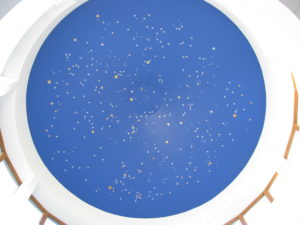One of Sister Larraine’s favorite creations occurred when she served on the design team for the chapel at the Owensboro Medical Health System HealthPark, which opened in 1998.
Sister Larraine painted this ceiling in the Owensboro Medical Health System HealthPark Chapel to depict how the stars aligned on the night the chapel was dedicated.
“I painted the stars on the ceiling at that chapel. It was a great challenge to replicate the night sky on the night the chapel was dedicated,” she said. “It’s 25-feet high. I felt like Michelangelo working on my back. I was sad when it was finished because I enjoyed doing it so much. It took four to five days to complete.”
Sister Larraine moved on to teach art and religion at Trinity High School in Whitesville, Ky., from 1987-90. She loved teaching, but had been trying to decide on a master’s degree. While helping the priest at Whitesville start RCIA, she spoke with the pastor at St. Columba Parish in Lewisport, Ky., near Owensboro, about trying pastoral ministry.
She spent two years at St. Columba, then from 1992-2002 served as a pastoral associate and liturgist at Precious Blood Church in Owensboro. It’s the longest she’s been in one ministry.
“Fr. Darrell Venters had the insight that what a church needs is good liturgy,” Sister Larraine said. “I really got to use music in liturgy there.” She plays the piano, percussion, and a little guitar.
“She started a ‘folk choir,’ which she described as a ‘choir made up of folks who don’t think they can sing,’ and she taught them how,” said Fr. Venters, who is now at the St. Thomas Aquinas Newman Center on the campus of Western Kentucky University. “We ended up with a phenomenal choir.”
Precious Blood had a school then, and Sister Larraine taught the importance of recycling to the students, he said.
 |
 |
 |
|
| Sister Larraine’s oil paintings on canvas that she did in her first painting class while a student at Brescia are still being used in Sister Mary Diane Taylor’s design class. | |
‘Loosed with the Gospel’
In 2002, Sister Larraine was noticing more and more immigrants around Owensboro. She was riding a bike along a farm one day and happened upon a migrant camp, reminiscent of one she’d seen as a child. “It looked like 1965,” she said.
“I prayed about whether I should do something about it,” she said. “I didn’t speak Spanish, and (Ursuline Sister Fran Wilhelm) was already working with Hispanics (with Centro Latino).”
“The next day, I got a call from the Kentucky Housing Corp. saying they wanted to explore offering housing to migrant farm workers,” Sister Larraine said. “I’ve always felt like if you pray and the door opens, you’re meant to walk through. If the door shuts, that time is over.”
She was told she’d have to create a nonprofit organization and have a board. “It was a very steep learning curve, I had to be involved in development and leadership,” she said.
She’d been on a few mission trips to Honduras, and doubted she could learn Spanish. A few Hispanics began coming to Precious Blood, so she thought learning some songs in Spanish would be welcoming. “I started classes at Owensboro Community College and fell in love with the language.”
That’s how Migrant Immigrant Shelter and Support (MISAS) got started, with Sister Larraine as its executive director. “There were a lot of uphill battles,” she said. “We looked at six or seven locations and had to fight the neighbors’ complaints at every one.” The housing corporation said the agency had to provide support programs to Hispanics as well as housing.
“It was as much a foreign language as Spanish was,” she said.
Sister Larraine’s actions were typical of the Ursuline spirit — see a need and do something about it.
“We have more freedom to take action, it’s not that we’re better people,” she said. “If I decide to start a nonprofit and work with no salary for awhile, I’m not dragging a family along. That was part of Angela Merici’s vision, that women should be ‘loosed in the streets with the Gospel.’ There’s certainly a lot of joy in it.”
She immersed herself in learning the migrant world. “I’m a pretty fierce proponent,” she said. “There’s probably no greater fundraising challenge than raising money for immigrants. There are a lot of misconceptions about immigration. ‘Why are these people here without documents?’ By default, most immigrants are very vulnerable to exploitation.”
She led MISAS until October 2006, two months after she learned her mother was diagnosed with cancer. “I worked hard to get good leadership in there,” she said. “My mother was not going to walk through cancer without me,” she said.
